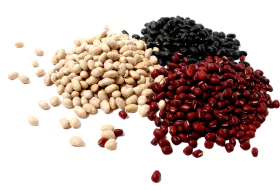Description
Bean seeds are fundamental to the cultivation of this legume that is widely consumed around the world. Below are some detailed characteristics of bean seeds:
Shape and Size:
Bean seeds are variously shaped, usually being rounded or oval.
The size varies depending on the variety, but generally the seeds are about 1 to 2 cm long and 0.5 to 1 cm wide.
Colour:
The color of bean seeds can vary greatly depending on the variety. The most common colors include black, brown, red, white, and streaky.
Examples of varieties: black beans, pinto beans, red beans, white beans, rajado beans, among others.
Structure:
Each bean seed is made up of the following parts:
Bark (or integument): The outer layer that protects the seed.
Bran: The outer layer that surrounds the endosperm, rich in fiber.
Endosperm: The bulk of the seed, which contains mostly starch and protein.
Germ: The inner part of the seed, rich in nutrients and able to germinate into a new plant.
Weight:
The weight of bean seeds varies depending on the variety, but generally each seed weighs 0.5 to 2 grams, depending on size and moisture.
Viability:
The viability of bean seeds depends on factors such as storage, humidity, and temperature. Well-stored seeds in proper conditions (cool, dry, and dark) can maintain their viability for several years.
Varieties:
There are numerous varieties of beans grown globally, each with specific characteristics of color, size, flavor, and cooking time.
Common varieties include black beans (used in dishes such as feijoada), pinto beans (common beans in Brazil), red beans (used in chili and other recipes), white beans (used in soups and stews), and rajado beans (common in Mexican cuisine).
Cultivation and Use:
Beans are grown in a variety of climates and soils around the world, making them an important source of protein, fiber, vitamins, and minerals in the human diet.
It is eaten cooked, in soups, stews, salads, and as a main ingredient in many traditional dishes around the world.
Nutrient:
Bean seeds are an excellent source of plant protein, dietary fiber, complex carbohydrates, vitamins (especially B complex), and minerals (such as iron, magnesium, and potassium).
Bean seeds play a crucial role in global food security, providing a nutritious and affordable source of essential plant proteins for many diets around the world.
- Bean seed
Production Capacity:
Not informed
Delivery Timeframe:
Not informed
Incoterms:
CIF - Cost, Insurance and Freight
FOB - Free on Board
Packaging Details:
Not informed
More about
Agranda Global
0-10
Employees
500K - 1M
Sales volume (USD)
30%
% Export sales
Year
Established
Business type
- Industry / Manufacturer
- Representative / Agent
- Distributor / Wholesaler
Keywords
- seeds
- food
- sugar
- coffee
- grains
- rice
- beans
- soybeans
- corn
- Agranda Global Ver Mais
Contact and location
-
Juliana ********
-
+55 16********
-
Ribeirão Preto / SP | Brazil






